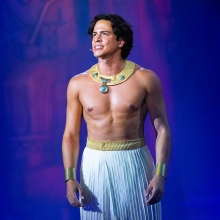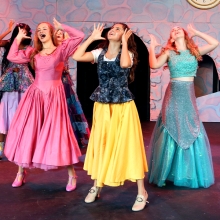On Wednesday, November 27th, the MTI office will close early at 1 PM ET for the Thanksgiving holiday weekend. Office operations will resume on Monday, December 2nd.
Tell Yourself How Lucky You Are: SEUSSICAL at the 14th Street Y
Tell Yourself How Lucky You Are: SEUSSICAL at the 14th Street Y
By Peter Filichia on May 18, 2012
in
Making Theater, Show/Author Spotlight
| Tags:
Filichia Features
 Sometimes you can tell you’re going to have a good time at a show just from the set.
Sometimes you can tell you’re going to have a good time at a show just from the set.In front of us on the second floor of the 14th Street Y is a sunny-looking playground. Center stage is a small slide, and surrounding it are bald automobile tires on which no one would dare drive. Now, however, they’ve received a new lease on life, because they’ve been painted with bright colors that enable them to proudly decorate the stage. One of them gets the added responsibility of being a swing.
It’s all for Amas Musical Theatre’s production of SEUSSICAL as done by its Academy Teens. The dozens of kids on stage may not come from each and every walk of life, but they’ve nevertheless traversed quite a few of them. As artistic producer Donna Trinkoff says to the audience before the show starts, “Our founder Rosetta LeNoire used to say, ‘When you’re singing and dancing, you can’t hate each other.’”
You bet. Or, as SEUSSICAL puts it, “A person’s a person’s no matter how small” – a message that fits perfectly in this era when we’re all working hard to wipe out bullying from the face of the earth.
That’s what most gratifying about seeing 26 disparate kids who have turned into a genuine team. Trinkoff tells us that they’d started rehearsals in October, but soon after they begin performing, the kids show they’re so accomplished that one wonders which October Trinkoff meant. 2009? 2008? 2007?
Director Christopher Scott stars the show by having JoJo reading The Cat in the Hat, which then comes to life when a behatted Samantha Randolph eases her way down that slide and rolls into his life. (Nice, isn’t it, that the Cat can be played by either a man, woman, boy or girl? There aren’t all that many roles in musical theater that allow for such free-flowing casting.)
When Benjamin Miller, an enchanting JoJo, goes upstage, he shows he’s learned the lesson that he must be louder then. Later, from the way that Miller’s voice soars when he sings, “I have wings and I can fly” you can tell that this is one of his favorite parts of the show.
He, however, is hardly the only standout. Take Kira Sirai Helper as Mayzie. Perhaps Lynn Ahrens lyric and Stephen Flaherty’s soaring melody automatically spurs someone playing her to greatness; the character’s big song, after all, is called “Amazing Mayzie.” Whatever the case, Helper indeed amazes. Schools have clubs called Future Teachers of America; if there’s a club that specializes in GUYS AND DOLLS called Future Adelaides of America, Kira Sirai Helper would be elected its president in a landslide.
“You can’t run away from a Sour Kangaroo,” goes one line. Nor would we want to when she’s as good as Sheika Murray, who, even at her young age, already knows how to sell a song. So does Matt Miller, the beautifully plaintive and avuncular Horton, and Angela Ruis, the amusing Gertrude. The latter learns to “Be careful what you wish for.” She wanted to change her body, and then regrets that she ever did. (It’s one of Seussical’s most important messages: moderation in all things is the key.)

As the Bird Girls who comment on the action, Crystal Brown, Megan Del Rosario, Gabrielle Dominique and Aspenne Rhoden work so well in tandem that if General Motors put them on the assembly line, we’d have more than a dozen new Chevys each week.
Some say that getting boys to appear in musicals isn’t easy. Not when you give them dangerous roles, and here three lads get to play the threateningly simian Wickersham Brothers. How Arena Cross, Devan Manning and Daniel Palladino pour themselves into their parts!
What a pleasure to watch a kid confidently get into position in the middle of a dance in such a way that you know he’d just hit his mark perfectly and isn’t even a quarter-inch off. Some young actors sings their notes with the accuracy of Pavarotti in his prime. Oh, every now and then, when one kid must hold a long note, he wavers in the middle of it. But only for a second: he gets back on track before he must finish singing.
Some who are in the audience – parents, grandparents, friends of the family – have dutifully attended because it was The Right Thing to Do for Your Kids. But soon they find that Theater of Obligation can yield some surprising rewards. The applause they give at the beginning of the show expresses their astonishment that everything is so good. It isn’t charitable applause at all, but smacks of genuine admiration. Only a little later, that audience has become even more complimentary, for everyone starts clapping a few seconds before the last note of a song is sung. No one can wait to telegraph to the kids how great they are.
I was told in advance that one young man had Asperger Syndrome, which is, according to the dictionary, “an autism spectrum disorder that is characterized by significant difficulties in social interaction.” How wonderful, then, to have a kid who’s affected by it meet the perfect antidote: theater.
That’s why, before the show started, I had a feeling that I wouldn’t be able to tell which kid had Asperger. I expected that the rehearsal process and performance would mitigate the syndrome and turn the lad into just another terrific component of this artistic machine. I’m delighted to say that I was right.
He’s Dane Brandt Lubart, now 21, but having too much fun with Amas to worry if he’s outgrown the “Academy Teens” label. “Since age five,” he says, “I wanted to get on stage, even if it meant going into an open area and putting on a show.” He frankly admits, “I like being someone I’m not.”
At certain performances, Lubart plays Horton. As he says, “Horton was always my favorite Dr. Seuss character. He and I are similar. He’s soft and loving and gullible. I was like that once. It’s dangerous to be that way because it can get you into deep trouble.”
When I point out that Horton gets deep satisfaction, too, for parenting Maizie’s child, Lubart agrees. “There are rewards,” he admits, before immediately showing that he isn’t agreeing merely to be agreeable. “Those rewards come with a price,” he warns. “Be too nice and you can regret it.” This wasn’t said with bitterness, but with a feeling that Lubart had simply come to terms with this reality of life.
He’s forthcoming when talking about Asperger. “I was four when I learned I had it,” he says. “It hasn’t been easy. Luck is one thing. Determination is another. I had to find my determination. I said to myself, ‘Dane, it’s worth a shot. Keep going. If you turn back now, you’ll never get into theater.’ I can’t think of anything else I want to do.
“People think that people with special needs can’t express themselves through the arts or anything. It’s not true. I’m working on a one-man show called Into the Light to show that people with special needs have light in them. I’ve learned that no matter what problems you have and what disabilities you have, take the challenge of them.
“A lot of people believe that Asperger is a disability. I say it’s not. It’s a unique quality to makes you expose your special talent. ‘Special needs’ is a point-of-view. It was a slight impediment when I first came to Amas five years ago. I had a really hard time with the dancing. It was an obstacle. I’d be so frustrated that I’d go off on the side, crying and stuff.”
Academy director June Rachelson-Ospa says that Juilliard graduate and actor Jimonn Cole (“A Raisin in the Sun”) was an important influence on Lubart. “We bring in speakers from time to time,” she says, “and Dane was so surprised to hear Jimonn say that had Tourette’s Syndrome. He felt that if that young man could succeed in theater,” she said before citing a Seussical song, “anything’s possible.”
Better still, Lubart has been a theatrical Pied Piper. His enthusiasm for Amas wound up getting his friend Henry Houghton involved. They soon had Bryant Reynolds and Devan Manning joining, too.
Houghton can also juggle, and director Scott gave the lad the chance to show what he could do when he wasn’t The Mayor of Whoville. Says Houghton, “I’m not a public person, but playing a mayor is fun. I like having a wife, too. I’d rather have one on-stage than off,” he admits.
He’s become an enthusiastic theatergoer, too. Once Houghton saw How to Succeed, he decided that he would someday like to play J. Pierrepont Finch. “I wouldn’t do it with a green bow tie, though,” he says, referencing what Nick Jonas recently sported. “I’d choose yellow, pink or black.”
Reynolds says, “I never used to be on time for anything, but this show taught me that I really have to be. I also know that if you make a mistake while performing, it’s okay. Just keep going.”
Manning hasn’t only been acting, but has also joined TRAC -- the acronym for a group called Teen Reviewers and Critics. Of SEUSSICAL, he says, “I’d give our show a really good review.” He’s not the only one.
License SEUSSICAL in your school or community theatre
Find a Production of SEUSSICAL playing near you
SEUSSICAL on MTIShowSpace
Watch our SEUSSICAL Playlist on YouTube
 Read all of FILICHIA FEATURES! You may e-mail Peter at pfilichia@aol.com. Check out his weekly column each Tuesday at www.masterworksbroadway.com and each Friday at www.kritzerland.com as well as his reviews for the Newark Star-Ledger on www.nj.com. His newest book, Broadway Musical MVPs, 1960-2010: The Most Valuable Players of the Past 50 Seasons, is now available through Applause Books and at www.amazon.com.
Read all of FILICHIA FEATURES! You may e-mail Peter at pfilichia@aol.com. Check out his weekly column each Tuesday at www.masterworksbroadway.com and each Friday at www.kritzerland.com as well as his reviews for the Newark Star-Ledger on www.nj.com. His newest book, Broadway Musical MVPs, 1960-2010: The Most Valuable Players of the Past 50 Seasons, is now available through Applause Books and at www.amazon.com.
























